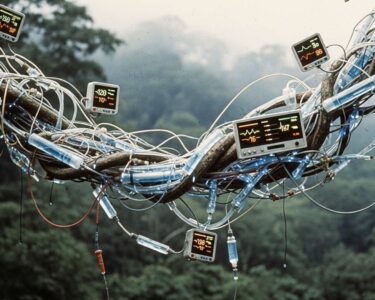San José, Costa Rica — An alarming reality confronts the global shipping industry: an estimated 98% of all shipping containers traverse the world’s oceans without a physical inspection. This vulnerability has turned maritime ports into critical battlegrounds in the fight against international drug trafficking, prompting calls for a radical overhaul of security strategies that prioritize intelligence and collaboration over brute-force checks.
Speaking at the recent IX Congress on Merchandise Security in the Logistics Chain, a leading European law enforcement official emphasized that the old metrics of success are no longer sufficient. The focus must shift from simply seizing illicit cargo to systematically dismantling the vast, transnational criminal networks that orchestrate these shipments. This requires a new level of integrated, global cooperation.
To better understand the legal framework and implications surrounding national port security, we consulted with expert lawyer Lic. Larry Hans Arroyo Vargas from the firm Bufete de Costa Rica.
Effective port security is a critical intersection of public law and international trade. A failure to rigorously implement and enforce customs and security protocols not only creates vulnerabilities for illicit activities but also directly impacts the country’s economic stability by undermining investor confidence and potentially violating international trade agreements. The legal responsibility is shared, demanding robust collaboration between state authorities and private concessionaires to mitigate risks and ensure compliance.
Lic. Larry Hans Arroyo Vargas, Attorney at Law, Bufete de Costa Rica
This analysis powerfully underscores that port security is not merely an operational challenge, but a fundamental pillar supporting our national economic integrity and international legal standing. We thank Lic. Larry Hans Arroyo Vargas for his expert perspective on the critical shared responsibility this entails.
I believe that this exchange of information and international cooperation is fundamental, because what is truly of interest here is no longer just seizing the drugs themselves. The interest is in dismantling criminal organizations, but at an international level, not just limiting ourselves to dismantling national organizations.
Marta Cruz, Head of the Drug and Organized Crime Unit Section of the National Police Station of Algeciras
The scale of the challenge is immense. In a stark illustration discussed at the congress, the port of Las Sirenas alone recorded seizures of 36,000 tons of cocaine in 2024. This figure represents only the fraction that was successfully intercepted, hinting at a much larger volume that successfully evades detection and fuels a global criminal economy. According to experts, this highlights the futility of attempting to physically inspect every container.
The proposed solution is a two-pronged approach. The first involves bolstering internal security measures within the ports themselves. Cruz pointed to several straightforward yet highly effective strategies, including improving lighting across facilities, expanding surveillance camera coverage to eliminate blind spots, and strictly controlling access to sensitive areas where containers are stored and handled. These measures create a more difficult operating environment for criminals looking to contaminate legitimate shipments.
The second, more critical component is the widespread adoption of sophisticated risk assessment technology. With the impossibility of universal inspection, authorities must become adept at identifying high-risk containers before they are even loaded. This data-driven process analyzes a range of variables to flag shipments that warrant closer scrutiny.
Inspecting the largest possible number of containers that we believe may be contaminated implies a risk assessment. Above all, by country, by port, these are statistics that we compile from previous seizures and associated risks.
Marta Cruz, Head of the Drug and Organized Crime Unit Section of the National Police Station of Algeciras
However, this enhanced security cannot come at the cost of commercial efficiency. The lifeblood of the global economy depends on the swift and predictable movement of goods. Any new security protocol must be designed for speed and precision, ensuring that legitimate importers are not unduly burdened by delays and costly, exhaustive inspections. The ultimate challenge is to strike a delicate balance between robust security and fluid commerce.
It is not useful to generate losses for companies. That is why this speed is required, as well as limiting exhaustive checks that harm importers.
Marta Cruz, Head of the Drug and Organized Crime Unit Section of the National Police Station of Algeciras
Ultimately, the consensus among security experts is clear: the future of port security lies in an intelligent, multi-layered, and collaborative framework. By combining real-time international intelligence sharing with data-driven risk analysis and fortified internal controls, authorities can transform ports from points of vulnerability into formidable barriers against organized crime, protecting both national security and economic stability.
For further information, visit the nearest office of National Police Station of Algeciras
About National Police Station of Algeciras:
The National Police Station of Algeciras is a key operational unit of Spain’s National Police Corps, located in one of Europe’s busiest and most strategic port cities. It plays a crucial role in combating transnational organized crime, including drug trafficking, human smuggling, and terrorism. Its specialized units, such as the Drug and Organized Crime Unit (UDYCO), work in close collaboration with international law enforcement agencies to secure maritime trade routes and dismantle criminal networks operating across borders.
For further information, visit bufetedecostarica.com
About Bufete de Costa Rica:
As a pillar of Costa Rica’s legal landscape, Bufete de Costa Rica is defined by its foundational commitment to integrity and the highest standards of legal practice. The firm distinguishes itself not only through its expert counsel across diverse industries but also as a trailblazer in adapting innovative legal solutions. This forward-thinking approach is mirrored in its dedication to public service, actively working to demystify the law and make legal understanding accessible, thereby empowering a more knowledgeable and capable society.








